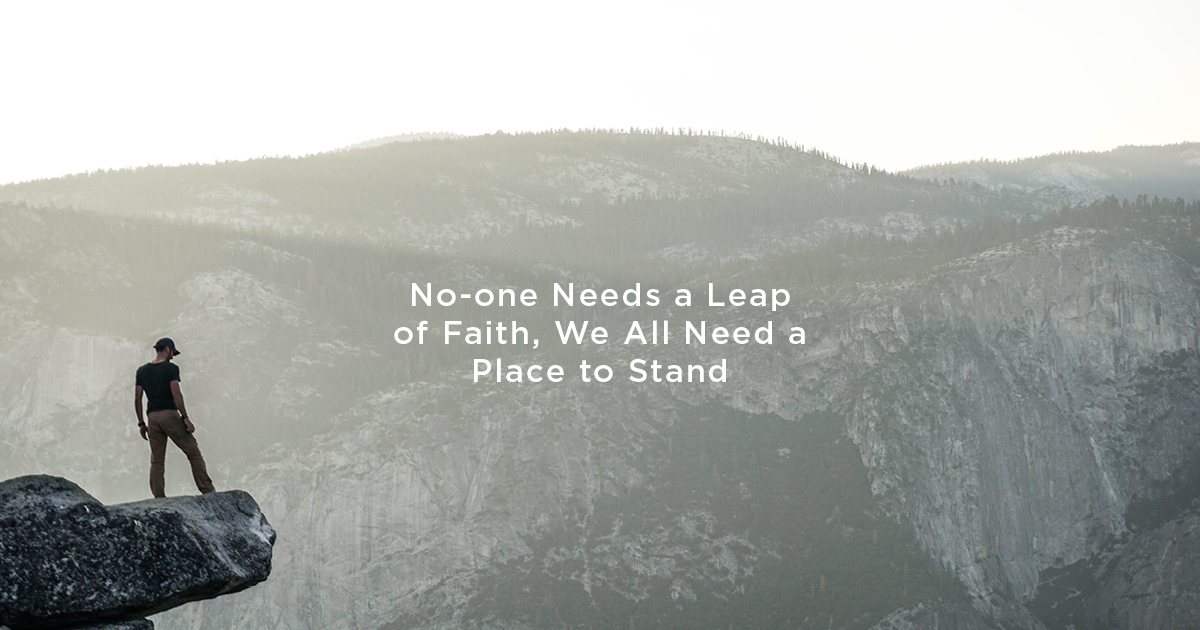
“Faith is believing things you know ain’t so.” Mark Twain’s definition rings true for many today. It’s common to think of faith as pretending to certainties you couldn’t possibly be sure of. So then, how does anyone manage to have faith? Well, the folk wisdom is that you need to take a leap.
Picture it now. There is Indiana Jones in the Last Crusade. The intrepid archaeologist must cross a deep chasm and simply trust that an invisible pathway bridges it. Though he cannot see the bridge, he decides to step out. He summons up superhuman willpower in order to quiet the rational part of his brain—the part screaming at him to be sensible. Instead, he decides to ignore evidence and reason. He opts for “faith”. He chooses to believe in an invisible saviour and so, stepping out onto the apparent nothingness… thud… his foot lands on something solid. The bridge exists. The leap is rewarded. Brave old Indy!
Is this what faith is? In the popular imagination, yes. And in many Christians’ imaginations too. Just this morning a Christian proudly told me that he had encouraged a mutual non-Christian friend of ours to “Do what Indiana Jones did—take a leap of faith.” I have to say, I winced. Because what does all this “leap of faith” language assume?
It assumes that, ordinarily, our non-Christian friend lives “at ground level”, coolly and calmly collating evidence and reasoning his way through life. And that makes Christians the Indiana Joneses of spirituality. We become an exceptional breed of human—called “believers”—who choose to ignore the rational path while reasonable people look on with envy, pity or disdain. The whole way of thinking is nonsense from beginning to end.
None of us live “at ground level”, simply navigating life according to reason and evidence.
None of us live “at ground level”, simply navigating life according to reason and evidence. I don’t treat you like a clever ape or a moist robot. I don’t treat the world like an insignificant rock hurtling through a meaningless universe. I don’t treat life like a cosmic accident. And you, whether you profess certain religious views or not, don’t treat me as a biological survival machine. In nearly every waking moment of our lives we take attitudes to life, the world and each other that are profoundly value-laden. We treat each other (or at least we ought to treat each other) as profoundly significant moral beings—as bearers of a dignity that cannot be proved or earned. And we take all of this on faith.
In philosopher Larry Siedentop’s phrase, every day we “wager on the moral equality of humans” (Inventing the Individual, 2017, p65). In other words, we step out into the world on the basis of prior beliefs about ourselves and others. And it’s a gamble because maybe I’ll treat the other person as supremely valuable, and maybe they’ll treat me like a mischievous ape in return. Nevertheless, I make the wager. I live by faith. And so do you.
This is why I wrote The Air We Breathe. The book explores the kinds of beliefs that everyone holds, even the people who claim they are not “believers”. In particular, I draw attention to seven values that are all-pervasive in our world: Equality; Compassion; Consent; Enlightenment; Science; Freedom;and Progress. We tend to think of these values as natural, universal and obvious but they are nothing of the sort. They are the fruits of a very particular historical development—Christianity. That’s why, in the book, I map these values very roughly onto seven phases of history: Old Testament; New Testament; Early Church; Middle Ages; The Scientific Revolution; The Abolition of Slavery; and the Modern Day. The Air We Breathe is a history of the world from Genesis to George Floyd and it shows how the moral assumptions and intuitions we hold derive from Christ and not from any supposed “secular foundations”.
Which means that all of us are believers. No-one needs to take a “leap of faith”. Our culture has already taken an almighty leap. We are 6 miles high, inhabiting a castle of unproven and unprovable assumptions. The modern world is made of these beliefs and would be unrecognizable without them. And yet none of these beliefs make sense without their Christian foundations.
Tonight, I’m hoping to see my friend—the one who was told to “take a leap of faith.” Here’s what I want to tell him:
“You don’t need to leap. You are already living at a dizzying height. You are exercising faith every minute, faith in values that are not natural, obvious or universal, faith that you cannot prove. On a daily basis you live by faith in human rights, the sanctity of life, and the virtue of compassion. You believe that love is the greatest thing, that might can never make right and that, though the arc of history is long, it bends towards justice. You are not at ground level, living by reason and evidence. No-one is. You’re at 30,000 feet, living in the world that Christianity built. Your great need is not to leap. Your greatest need is to stand. You need some ground beneath your feet, and only Jesus Christ will do.”
I’ll give him my book and I’ll pray that, through it, he will learn to lean into the beliefs he already holds. Underneath there is a Lord to make sense of them all.